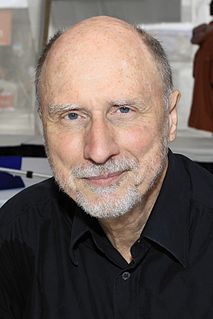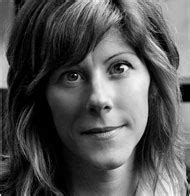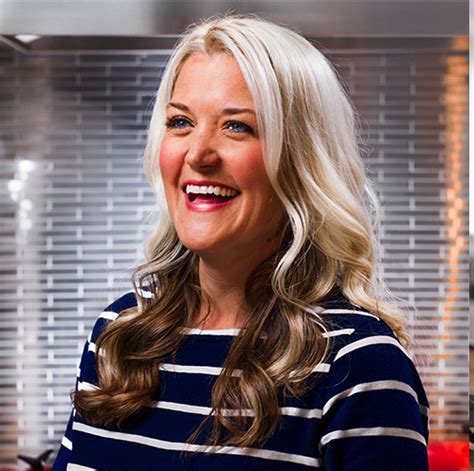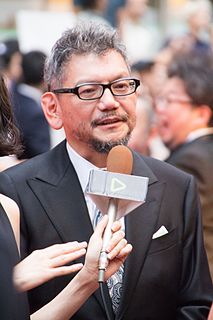A Quote by Stephen King
In a brilliant fusion of fact and fiction, Jayne Anne Phillips has written the novel of the year. It's the story of a serial killer's crimes and capture, yes, but it's also a compulsively readable story of how one brave woman faces up to acts of terrible violence in order to create something good and strong in the aftermath. Quiet Dell will be compared to In Cold Blood, but Phillips offers something Capote could not: a heroine who lights up the dark places and gives us hope in our humanity.
Quote Topics
Acts
Aftermath
Also
Anne
Blood
Brave
Brilliant
Capture
Cold
Compared
Could
Create
Dark
Dark Place
Dark Places
Dell
Faces
Fact
Fact And Fiction
Fiction
Fusion
Gives
Good
Heroine
Hope
How
Humanity
Killer
Lights
Novel
Offers
Order
Our
Places
Quiet
Serial
Serial Killer
Something
Something Good
Story
Strong
Terrible
Up
Us
Violence
Will
Woman
Written
Year
Yes
Related Quotes
Great fiction has been written out of the very darkest circumstances of our narco violence, and nothing written in either fiction or nonfiction has penetrated that darkness so memorably - you can even say beautifully, a relentless riveting forensic dark beauty that some readers in fact find themselves unable to endure - as Roberto Bolaño's 2666. Especially in "The Part about the Crimes." But here's the thing: nobody would call 2666 a "narco novel."
You can't assume if you do something contentious that people will be on your side. The moment violence enters the story, the story changes. Then the question is, "How do you face up to violence?" And then you have to have a no-compromise position. And this is quite simply a lesson we learn in the school playground.
A form wherein we can enjoy simultaneously what is best in both the novel and the short story form. My plan was to create a book that affords readers some of the novel's long-form pleasures but that also contains the short story's ability to capture what is so difficult about being human - the brevity of our moments, their cruel irrevocability.
The short story that eventually grew into Constellation was the first fiction set in Russia that I'd ever written, and that was right around the time I was giving up on a doomed, never-to-be-seen first novel. While I saw it could be something bigger, in hindsight fortuitous timing was as responsible as anything.
I get up in front of a bunch of kids and say 'Hey, I'm gonna tell you a new story. Who wants to be in a new story?' Well some kid always sticks up their hand and that gives me a name, but it doesn't give me a story. I just say whatever comes to my mind and usually it's not that good. Every once in a while, however, I say something that turns into a really good story.
Eva is a story of repetition. It is a story where our protagonist faces the same situation many times over and determinedly picks himself back up again. It is a story of the will to move forward, even if only a little. It is a story of the resolve to want to be together, even though it is frightening to have contact with others and endure ambiguous loneliness. I would be most gratified if you found enjoyment in these four parts as it takes the same story and metamorphoses it into something different.
I don't deliberately look for something dark or bleak or disconnected, in fact that's not something I'm even conscious of in the work as I'm making it. I'm always trying to create beauty, reveal hope, show the sense of longing that exists in isolation and loneliness, and capture the search for something greater inside all of my subjects.
Before I begin a novel I have a strong sense of at least one central character and how the story begins, and a more vague sense of where things may wind up, but at some point, if the novel is any good at all, the story and characters take on lives of their own and take over the book, and the writer has to be open to that.
Sam [Phillips] wanted I Walk The Line up - you know, up-tempo. And I put paper in the strings of my guitar to get that (vocalizing) sound, and with the bass and the lead guitar, there it was. Bare and stark, that song was when it was released. And I heard it on the radio and I really didn't like it, and I called Sam Phillips and asked him please not to send out any more records of that song.
Only the violent acts of men "count" toward something besides evil in a patriarchy. It is the male story of violence that is sanctioned both socially and aesthetically. The male hero and acts of heroism require violence. Everyone is okey dokey with that. We are only beginning to see that constricting set of truths open up a little.



































